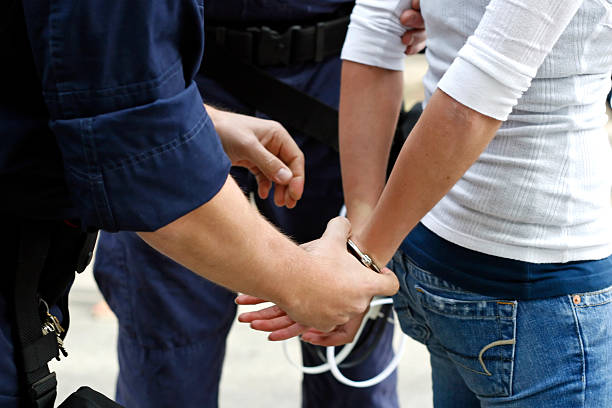What’s the difference between a police arrest and a citizen’s arrest Australia? An obvious difference is that the former is covered by legal authority because it is their duty as police officers. While the other one is only legal in certain circumstances.
This article will delve deeper into the other differences between police and citizen’s arrest Australia.
Section 100 of the Law Enforcement (Powers and Responsibilities) Act 2002 (LEPRA) provides for the law on citizen’s arrest NSW. It states that a citizen, without a warrant, may only arrest another in specific circumstances:
- the person is in the act of committing an offence under any Act or statutory instrument,
- the person has just committed any such offence, or
- the person has committed a serious indictable offence for which the person has not been tried.
Citizen’s Arrest Australia vs. Police Arrest
| Citizen’s arrest Australia | Police arrest | |
| Legal basis | Section 100 of the Law Enforcement Act 2002 | Sections 99, 101, 102, 103, 104 of the Law Enforcement Act 2002 |
| Grounds for arrest | Any person may arrest another even if he or she has no warrant to do so if: (a) a person is in the act of committing an offence under any Act or statutory instrument, or (b) a person has just committed any such offence, or (c) a person has committed a serious indictable offence for which the person has not been tried. | A police officer may arrest without a warrant: 1) if the police officer suspects on reasonable grounds that the person is committing or has committed an offence; 2) to stop the commission of an offence; 3) to stop a person from fleeing from the police officer at the location of the offence; 4) to establish the identity of a person; 5) to ensure that the person appears before a court in relation to the offence; 6) to obtain property in the possession of the person that is connected with the offence; 7) to preserve evidence of the offence or prevent the fabrication of evidence; 8) to prevent the harassment of, or interference with, any person who may give evidence in relation to the offence; or 9) to protect the safety or welfare of any person. |
| Necessity | Citizen’s arrest Australia should only be carried out where it is absolutely necessary, as they come with legal consequences and risks for the arrestor. | Police arrests, on the other hand, are typically carried out by trained professionals with the necessary authority and equipment. |
| Force | A person carrying out a citizen’s arrest Australia must only use as much force as is reasonably necessary to carry out the arrest. | Section 230 of the Act provides that: It is lawful for a police officer exercising a function under this Act or any other Act or law in relation to an individual or a thing, and anyone helping the police officer, to use such force as is reasonably necessary to exercise the function. Section 231 of the Act also states that: A police officer or other person who exercises a power to arrest another person may use such force as is reasonably necessary to make the arrest or to prevent the escape of the person after arrest. |
| Consequences | Unlawful citizen’s arrest Australia can result in legal consequences, including civil claims for damages, and may lay the person conducting the arrest open to charges. | Police officers have more protection from legal consequences, but they must still follow proper procedures and guidelines. |

Legal Implications of Unlawful Citizen’s Arrest Australia
An unlawful citizen’s arrest can have various legal implications. Some of the potential consequences include civil action against the arrestor, leading to damages for a tort such as assault, false imprisonment, or negligence.
Unlawful citizen’s arrests may also result in criminal charges such as assault or deprivation of liberty. Therefore, individuals should exercise caution and ensure they fully understand the legal requirements and potential consequences before attempting a citizen’s arrest.
Individuals exercising this statutory privilege must be careful because when you detain someone, you have to take them to an officer with authority as soon as you can. Additionally, you must take them along with any property that you may have discovered on them. Note that you may face charges of:
- assault,
- false imprisonment, or
- deprivation of liberty
if you do not turn over the arrested person to the authorised officers as quickly as feasible.
Legal Implications of Police Arrest
There are legal consequences for unlawful police arrests:
1. The police officer ceases to be acting in the execution of his or her duty.
This means that when a police officer begins a lawful task related to his duties, he is acting in the performance of his duty. He will remain acting in this capacity as long as he is working on the task and does not take any actions that would cause him to stop acting in this capacity.
2. Evidence obtained in consequence of the arrest is illegally or improperly obtained evidence.
Section 138 of the Evidence Act prohibits the admission of evidence that one illegally or improperly obtains unless the desirability of admitting the evidence outweighs the undesirability of admitting evidence that has been obtained in the way in which the evidence was obtained. This applies to evidence of any offence that one obtains in consequence of the illegal arrest.
Legal Requirements for Citizen’s Arrest Australia
There are several legal requirements for a citizen’s arrest to be lawful, including:
- Basis for arrest. A person must have actual knowledge that the individual facing arrest has committed an offence. A citizen’s arrest cannot be based on a reasonable suspicion alone, as in the case of police arrests.
- Necessity. One must carry out a citizen’s arrest only when it is absolutely necessary, such as to prevent the person committing further offences or making further offences. They must not carry it out as a first resort.
- Use of force. The person carrying out the arrest must only use as much force as is reasonably necessary to carry out the arrest.
- Delivery to police custody. The person carrying out the arrest must deliver the person arrested into police custody without delay and provide the police with information about the reasons for the arrest.

Schedule a Consultation With Us
If a citizen has arrested you with reasonable force, it is important to speak with a lawyer as soon as possible. Furthermore, citizens’ arrest powers are complex and vary from state to state, so it is important to understand the law in your jurisdiction.
JB Solicitors’ criminal defence lawyers can help you ensure the protection of your rights. Contact us today.
